1 Language and Social Variation Zhumaliyeva R. Z.

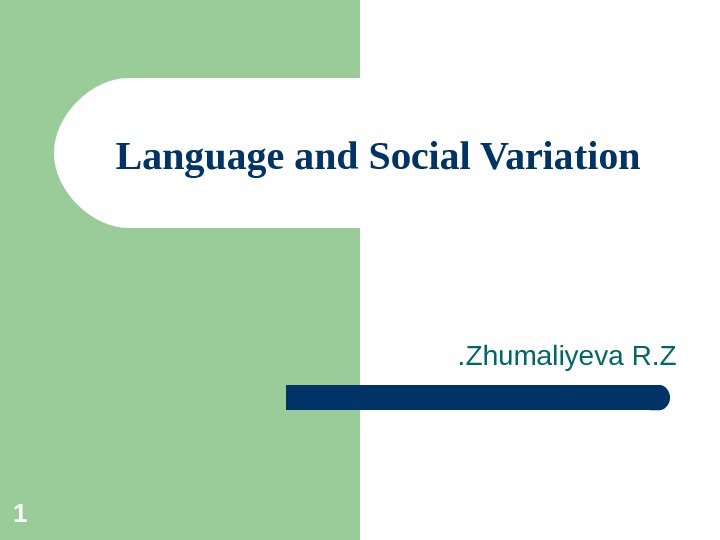
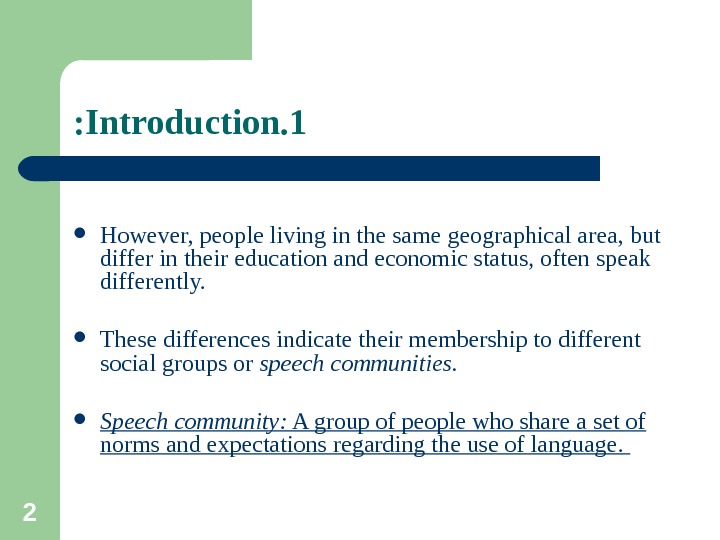

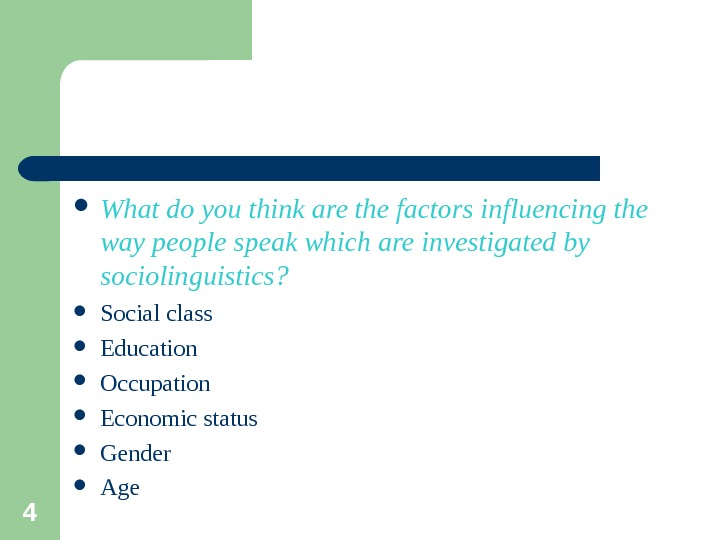

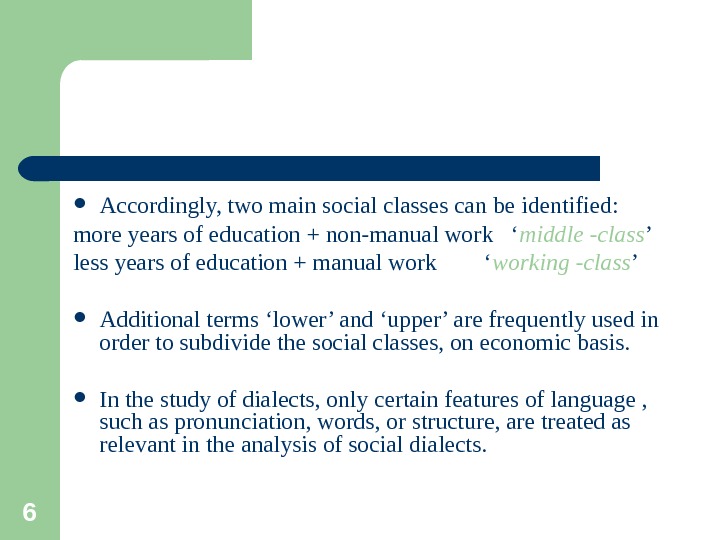







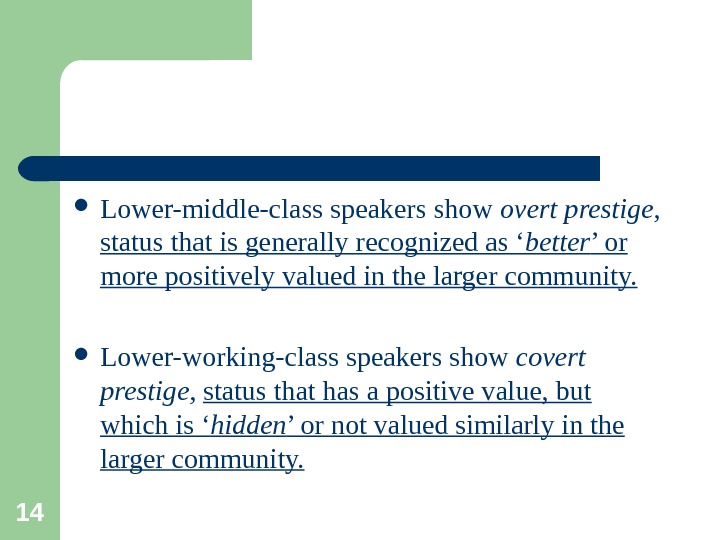

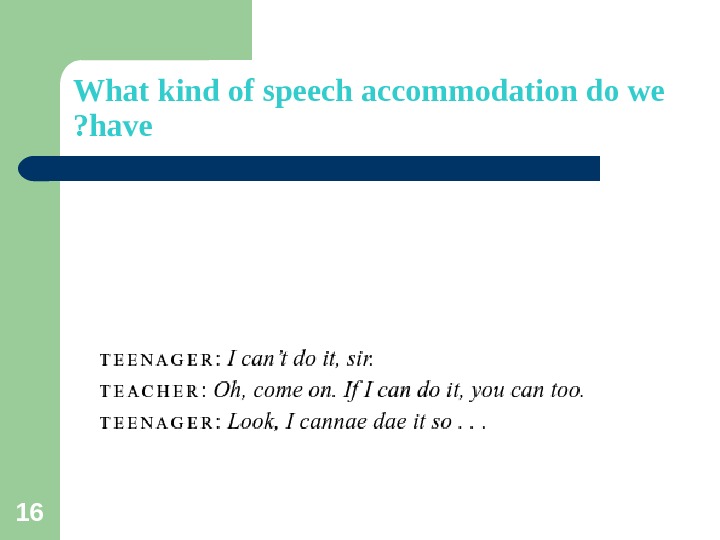
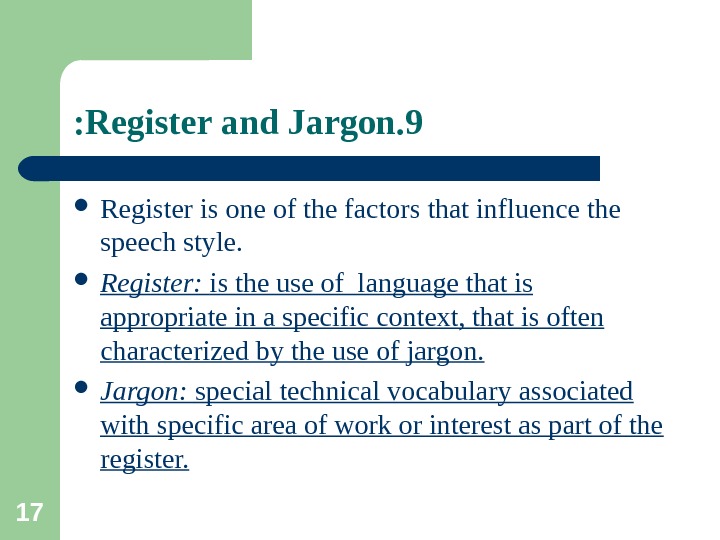

language_and_social_variation_rzh.ppt
- Размер: 430.5 Кб
- Количество слайдов: 18
Описание презентации 1 Language and Social Variation Zhumaliyeva R. Z. по слайдам
 1 Language and Social Variation Zhumaliyeva R. Z.
1 Language and Social Variation Zhumaliyeva R. Z.
 2 1. Introduction: However, people living in the same geographical area, but differ in their education and economic status, often speak differently. These differences indicate their membership to different social groups or speech communities. Speech community: A group of people who share a set of norms and expectations regarding the use of language.
2 1. Introduction: However, people living in the same geographical area, but differ in their education and economic status, often speak differently. These differences indicate their membership to different social groups or speech communities. Speech community: A group of people who share a set of norms and expectations regarding the use of language.
 3 2. Sociolinguistics: is the study of relationship between language and society. This is a broad area of investigation that developed through the interaction of linguistics with a number of other academic disciplines. Sociolinguistics Linguistics Sociology Social Psychology Anthropology
3 2. Sociolinguistics: is the study of relationship between language and society. This is a broad area of investigation that developed through the interaction of linguistics with a number of other academic disciplines. Sociolinguistics Linguistics Sociology Social Psychology Anthropology
 4 What do you think are the factors influencing the way people speak which are investigated by sociolinguistics? Social class Education Occupation Economic status Gender Age
4 What do you think are the factors influencing the way people speak which are investigated by sociolinguistics? Social class Education Occupation Economic status Gender Age
 5 3. Social Classes: In the social study of dialects, it is social class that is used to define a group of speakers as having something in common. What do you think are the criteria used in the classification of the social classes? Social Class education occupation Economic Status
5 3. Social Classes: In the social study of dialects, it is social class that is used to define a group of speakers as having something in common. What do you think are the criteria used in the classification of the social classes? Social Class education occupation Economic Status
 6 Accordingly, two main social classes can be identified: more years of education + non-manual work ‘ middle -class ’ less years of education + manual work ‘ working -class ’ Additional terms ‘lower’ and ‘upper’ are frequently used in order to subdivide the social classes, on economic basis. In the study of dialects, only certain features of language , such as pronunciation, words, or structure, are treated as relevant in the analysis of social dialects.
6 Accordingly, two main social classes can be identified: more years of education + non-manual work ‘ middle -class ’ less years of education + manual work ‘ working -class ’ Additional terms ‘lower’ and ‘upper’ are frequently used in order to subdivide the social classes, on economic basis. In the study of dialects, only certain features of language , such as pronunciation, words, or structure, are treated as relevant in the analysis of social dialects.
 7 4. Education and Occupation: How do you think that education and occupation would affect the way that people speak? Labov (1966) P. 207 Trudgill (1974) P.
7 4. Education and Occupation: How do you think that education and occupation would affect the way that people speak? Labov (1966) P. 207 Trudgill (1974) P.
 8 Labov (1966(
8 Labov (1966(
 9 Trudgill (1974(
9 Trudgill (1974(
 10 5. Social Marker: According to the previous studies, the /r/ indicates the speaker membership in a particular social group in a specific place. So, post vocalic /r/ functions as a social marker. Social marker: a linguistic feature that marks the speaker as a member of a particular social group. E. g. dropping /g/ in –ing and dropping initial /h/ Think of linguistic features that function as a social marker in your society?
10 5. Social Marker: According to the previous studies, the /r/ indicates the speaker membership in a particular social group in a specific place. So, post vocalic /r/ functions as a social marker. Social marker: a linguistic feature that marks the speaker as a member of a particular social group. E. g. dropping /g/ in –ing and dropping initial /h/ Think of linguistic features that function as a social marker in your society?
 11 6. Speech Style and Style-Shifting: Labov (1966) included another element that allowed him to investigate speech style. Speech style: away of speaking that is either formal/ careful or informal/casual. He noticed that some shift from informal to formal style. When?
11 6. Speech Style and Style-Shifting: Labov (1966) included another element that allowed him to investigate speech style. Speech style: away of speaking that is either formal/ careful or informal/casual. He noticed that some shift from informal to formal style. When?

 13 7. Prestige: Why? This would be better explained in relation to the idea of ‘ prestige’. Lower-middle-class speakers shift radically from casual to careful style more than lower-working class, in order to be perceived as having higher social status.
13 7. Prestige: Why? This would be better explained in relation to the idea of ‘ prestige’. Lower-middle-class speakers shift radically from casual to careful style more than lower-working class, in order to be perceived as having higher social status.
 14 Lower-middle-class speakers show overt prestige, status that is generally recognized as ‘ better ’ or more positively valued in the larger community. Lower-working-class speakers show covert prestige, status that has a positive value, but which is ‘ hidden ’ or not valued similarly in the larger community.
14 Lower-middle-class speakers show overt prestige, status that is generally recognized as ‘ better ’ or more positively valued in the larger community. Lower-working-class speakers show covert prestige, status that has a positive value, but which is ‘ hidden ’ or not valued similarly in the larger community.
 15 8. Speech Accommodation: Variation in speech style can be a function of speaker’s social class, attention to speech, as well as his perception of the listener. Speakers accommodate their speech according to the listener. Speech accommodation: modifying speech style toward or a way from the perceived style of the person being talked to. toward the listener convergence Away from the listener divergence
15 8. Speech Accommodation: Variation in speech style can be a function of speaker’s social class, attention to speech, as well as his perception of the listener. Speakers accommodate their speech according to the listener. Speech accommodation: modifying speech style toward or a way from the perceived style of the person being talked to. toward the listener convergence Away from the listener divergence
 16 What kind of speech accommodation do we have?
16 What kind of speech accommodation do we have?
 17 9. Register and Jargon: Register is one of the factors that influence the speech style. Register: is the use of language that is appropriate in a specific context, that is often characterized by the use of jargon. Jargon: special technical vocabulary associated with specific area of work or interest as part of the register.
17 9. Register and Jargon: Register is one of the factors that influence the speech style. Register: is the use of language that is appropriate in a specific context, that is often characterized by the use of jargon. Jargon: special technical vocabulary associated with specific area of work or interest as part of the register.
 18 10. Slang: words or phrases used instead of more everyday forms by younger speakers or groups of special interest. Slang is an aspect of social life that is subject to fashion. It is used by speakers who share the same ideas and attitudes in order to distinguish themselves from others. It is used as a group marker during a limited stage of life. Slang expressions ‘grow old’ quickly. Taboo terms: words or phrases that are avoided for reasons related to religion, politeness, or prohibited behavior.
18 10. Slang: words or phrases used instead of more everyday forms by younger speakers or groups of special interest. Slang is an aspect of social life that is subject to fashion. It is used by speakers who share the same ideas and attitudes in order to distinguish themselves from others. It is used as a group marker during a limited stage of life. Slang expressions ‘grow old’ quickly. Taboo terms: words or phrases that are avoided for reasons related to religion, politeness, or prohibited behavior.

